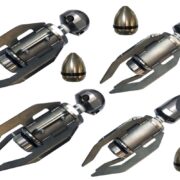Mowing your lawn is probably the most important landscaping job to stay on top of. Just a few weeks without mowing can leave your grass too long for most outdoor activities. Another month without attention, and you’ll have a veritable savannah on your hands. In order to keep up on your lawn, you’ll need to choose the correct type of mower. Here are few of the most common types to consider.
Table of Contents
Push Mower
Push mowers do not move by themselves. That means you have to walk behind the machine, physically pushing it forward on its wheels. This makes using a push mower a slightly more exertive activity. With that being said, most push mowers are relatively lightweight.
Walk Behind Mower
A walk behind mower propels itself along while you walk behind it, picking up the clippings as you go. Some variants also mulch the clippings, allowing them to serve as fertilizer for the lawn.
Zero-Turn Mower
With the mowing apparatus in front, these machines use their turning radius to cut close to edges. This makes them a favorite for people with intricate lawn designs or lots of gardens interspersed among their grass.
Stand-On Mower
These self-propelled mowers are driven by an operator standing on the back of the machine. They are easier to use than push mowers, but aren’t as bulky as typical riding mowers.
Riding Mower
These impressive machines look like small tractors and allow their operators to mow the lawn while sitting atop the machine. They combine impressive speed with a sizable mowing radius, meaning they can mow a large space in a short amount of time. There’s a reason this is the preferred mower for sports fields and other massive grassy areas.
Deciding Between The Different Types Of Mowers
Now that you know what types of mowers are out there, it’s time to determine which is the best option for you. Here’s what you should consider before making your choice.
Your Budget
Some mowers are more expensive than others. Push mowers, by far the simplest machines listed above, are often fairly afordable. Riding mowers, on the other hand, are as expensive as their size and power suggests they’d be. You’ll need to consider how much you can spend before committing to a particular type of mower.
The Size Of Your Lawn
For smaller lawns, a simple push mower should suffice. Riding mowers are better for larger areas since they can cover much more ground. If you use too small a mower on a massive property, you could make lawn maintenance an all-day task.
Your Physical Strength
While using a push mower isn’t especially difficult, it does require a certain amount of strength. It also forces you to keep your feet moving as you physically cover the entire expanse of your lawn. This can be a good thing if you’re trying to stay in shape, but it could be difficult if you’re physically impaired. A stand-on or riding mower might be better if you want lawn maintenance to be less labor intensive.
The Precision Required
Riding mowers are great for covering large areas, but they’re not ideal for working around intricate gardens or getting into tight places. While smaller push mowers can be better for this type of work, zero turn mowers are the gold standard when it comes to precision mowing. Their minute turning radius and detached mower apparatus making it much easier to perfectly edge the most complicated portions of your lawn.
The Scale Of Your Operation
If you’re just a single individual with a typical yard, then you should probably invest in a single mower. If, on the other hand, you’re operating a lawn care or landscaping business, you might want to combine these options according to your specific needs.
Choosing the right mower is all about making an informed decision. Now that you know what to keep in mind, you should have no problem picking the machine that’s best suited to your particular circumstances.












Comments